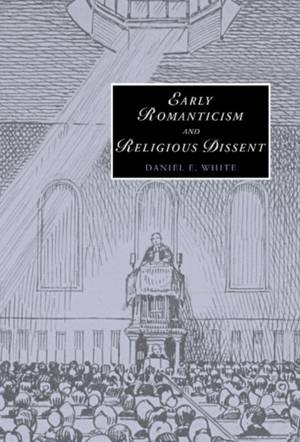
Door een staking bij bpost kan je online bestelling op dit moment iets langer onderweg zijn dan voorzien. Dringend iets nodig? Onze winkels ontvangen jou met open armen!
- Afhalen na 1 uur in een winkel met voorraad
- Gratis thuislevering in België vanaf € 30
- Ruim aanbod met 7 miljoen producten
Door een staking bij bpost kan je online bestelling op dit moment iets langer onderweg zijn dan voorzien. Dringend iets nodig? Onze winkels ontvangen jou met open armen!
- Afhalen na 1 uur in een winkel met voorraad
- Gratis thuislevering in België vanaf € 30
- Ruim aanbod met 7 miljoen producten
Zoeken
Omschrijving
Religious diversity and ferment characterize the period that gave rise to Romanticism in England. It is generally known that many individuals who contributed to the new literatures of the late eighteenth century came from Dissenting backgrounds, but we nonetheless often underestimate the full significance of nonconformist beliefs and practices during this period. Daniel White provides a clear and useful introduction to Dissenting communities, focusing on Anna Barbauld and her familial network of heterodox 'liberal' Dissenters whose religious, literary, educational, political, and economic activities shaped the public culture of early Romanticism in England. He goes on to analyze the roles of nonconformity within the lives and writings of William Godwin, Mary Wollstonecraft, Samuel Taylor Coleridge, and Robert Southey, offering a Dissenting genealogy of the Romantic movement.
Specificaties
Betrokkenen
- Auteur(s):
- Uitgeverij:
Inhoud
- Aantal bladzijden:
- 286
- Taal:
- Engels
- Reeks:
- Reeksnummer:
- nr. 65
Eigenschappen
- Productcode (EAN):
- 9780521858953
- Verschijningsdatum:
- 5/02/2007
- Uitvoering:
- Hardcover
- Formaat:
- Genaaid
- Afmetingen:
- 162 mm x 229 mm
- Gewicht:
- 585 g

Alleen bij Standaard Boekhandel
+ 345 punten op je klantenkaart van Standaard Boekhandel
Beoordelingen
We publiceren alleen reviews die voldoen aan de voorwaarden voor reviews. Bekijk onze voorwaarden voor reviews.











